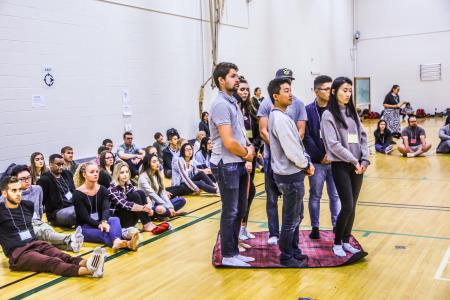
Csyra Angelli Pianar immigrated to Canada in 2015 with her family from the Philippines. Her understanding of the Canadian culture and its rich history were limited. But a special orientation activity has helped the dental hygiene student connect on an entirely different level.
The Kairos Blanket Exercise (KBE) is a unique history lesson where the participant experiences the history of Indigenous and non-Indigenous people in Canada in a personal way. During the blanket exercise, participants step onto blankets representing land, and into the role of First Nations, Inuit and Metis people. Facilitators are narrators assuming the role of European explorers and settlers. The goal of the exercise is to build awareness through situations that include pre-contact, treaty-making, colonization and resistance.
"The blanket exercise for me was very informative," says Pianar, adding after coming to Canada the majority of her knowledge came from sociology class. "Having to experience the whole thing in an interactive role play made it more real and made me realize the importance."
The first ever KBE happened during orientation week and was completed by all new incoming Faculty of Medicine & Dentistry students. The exercise is part of a new Indigenous Health curriculum being implemented in all programs in FoMD in response to the Call to Action from the report of the Truth and Reconciliation Commission.
For dental hygiene student Alicia Howery, the blanket exercise was her favourite activity during orientation week.
"I was not prepared for the emotional effect the after discussion would have on me. In my decompression group there were individuals who had been personally affected by the residential school system," says Howery. "This exercise really allowed them to share a bit about themselves that may not have ever come up. This exercise helps teach compassion and understanding and that is, I believe, as important as basic fundamental knowledge when it comes to acting as a health care professional."
Future sessions happening throughout the year will include sessions designed to build student knowledge of Aboriginal peoples' histories, experiences and knowledge systems, and will further develop their understanding of the significant connections between such knowledge and the professional roles and obligations of health professionals.